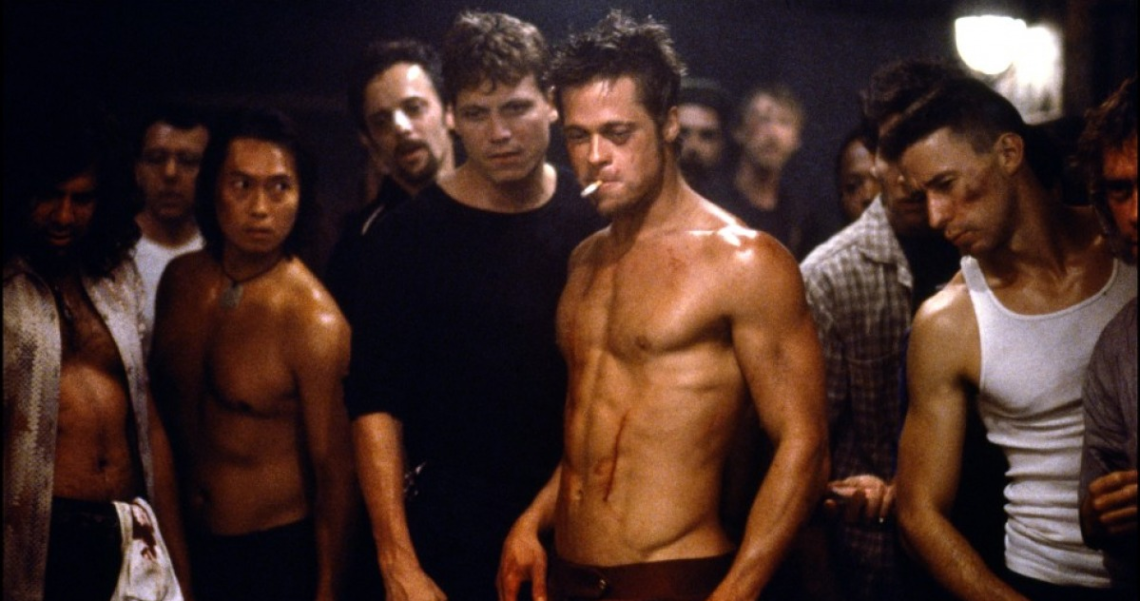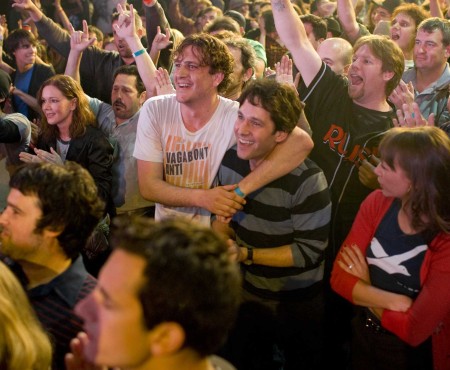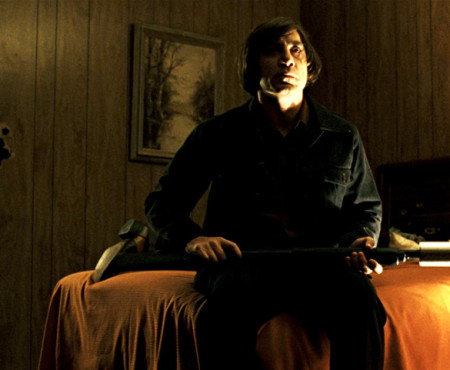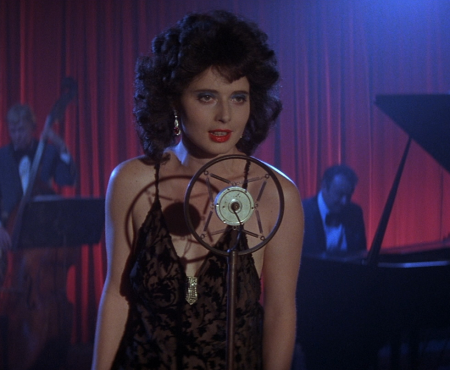To begin, I’ll let on that I’m a huge fan of David Fincher; I dig The Game, I enjoy Alien 3 and I even think that the one about Brad Pitt aging in reverse is a glorious example of adult fairytale-telling. I don’t consider it hyperbolic but more realistic to say that Fincher, along with Paul Thomas Anderson and Richard Linklater, is currently the voice of American cinema. The reasons are numerous, but for me can be boiled down to: Seven, Panic Room, Zodiac, The Social Network and, yes, even The Curious Case of Benjamin Button (if you’re going to rehash Forrest Gump, you may as well do it right). But Fight Club…well, that’s a different story.
Amidst all Fincher’s gothic visions, there’s often a humanist root to be found in the gloom, a conscientious connection – personified in a basically ‘good’ character – allowing us as viewers to relate. Seven has Detective Somerset, Zodiac has Dave Toschi and The Social Network has Eduardo Saverin. Fight Club has no one: everyone in its twisted world of men dealing with existential angst through pugilistic rage ranges from unlikable to downright irredeemable – The Narrator (Edward Norton) is neurotic and intentionally uninteresting, his alter-ego Tyler Durden (Brad Pitt) is a mindless nihilist, while all of their Fight Club compatriots are zombies present only to serve Fincher’s satirical vision. What technique there is on display fails to make up for the film’s lack of soul.
Original Fight Club author Chuck Palahniuk, himself an acquired taste, dominates Fincher’s movie, and yet the director makes his adaptation no easier to digest. In fact, pulping his characters in unflinching close-up (Jared Leto’s Angel Face has a particularly rough time) and throwing subliminal penises into the edit, Fincher makes Fight Club intentionally distasteful. Told with anarchic abandon, blunt force stands in for nuance, and what Fight Club says about conformity, consumerism and identity doesn’t exactly rewrite the book on any of them. That supposedly earth-shattering twist — the main character was the antagonist all along — is, as Charlie Kaufman put it in Adaptation, one of the oldest tricks in the book.
As the Narrator, Ed Norton’s flat narration and nerdy norm schtick (it’s unthinkable that this charisma-free milquetoast was once hailed as a successor to De Niro) allows Brad Pitt to upstage him all too easily. As was Fincher’s intention – the idea is that Pitt’s more charismatic Tyler Durden is a man to both fear and follow – but that doesn’t excuse the fact that the director tells the Narrator’s story with an agenda, minus any care or concern for his protagonist. Fincher and screenwriter Jim Uhls present all Fight Club‘s 30-something males as solipsistic man-children, destroying beautiful things largely for the fun of it. And while the film’s primary concern is for the masculine, Uhls and Fincher could still have done better with their sole female character than Helena Bonham Carter’s Marla Singer, essentially a more acidic forerunner for the Manic Pixie Dream Girl; quirks alone do not a personality make.
As Fight Club mocks society at the bottom, the brand of comedy is essentially gross-out by another name, encouraging you to laugh at utter despair and degradation, and at regular everyday life — your life. From the point of view of a disturbed, possibly sociopathic ‘hero’, Fight Club mocks that stability, that taking pleasure in little victories that comes with living in the real world. It’s a mean-spirited type of comedy, reliant on schadenfreude and the suggestion that you laugh at the unpleasantries of its characters’ existence, as well as your own. Only the people telling you through this film that your mundane life sucks are all part of Hollywood’s elite.
Destroying a Starbucks in a glossy, $63 million Hollywood production has all the hypocrisy of a professional boxer remarking that violence isn’t the answer, and the likes of Brad Pitt, Edward Norton and Jared Leto should never have been spokesmen for the ordinary and the downtrodden. Fight Club doesn’t lead by example — it fetishises Brad Pitt’s Tyler Durden, the very character that tells us we don’t have to be rich and beautiful to be happy, while its message of corporate rebellion is essentially baseless (Starbucks, Apple and Ikea may come in for a ribbing, but all still put up cash for their products to appear in the film). How can Fight Club tell you to reject the system when it’s obviously still a part of it?
I can admire Fight Club‘s craft, as much as it is a soiled, nicotine-stained filter through which we view Chuck Palahniuk’s already grim world. I can admire the punk attitude to storytelling, even if the punk message itself is ultimately hypocritical and hollow. I can also admire certain performances — the curiously over-praised Norton aside, most of the cast deliver turns finely-tuned by Fincher’s notorious multiple take approach. Fight Club is a film I can cautiously admire when it’s taken down to parts — but love? This film doesn’t want my love, nor anybody’s else’s; Fight Club may be iconic and technically proficient, but it’s more distant than perhaps any film to attain “modern classic” status.





















22 thoughts on “Challenging The Canon: “Fight Club””
The only thing I’d argue with, is the absence of humanism. Palahniuk paints the world through a nihilistic lens but there’s always sympathy for his characters. They hate the world, and a lot of them hate themselves, but Palahniuk, and sometimes the reader, loves them.
That may be true of Palahniuk, but it’s just not what I get from Fincher’s adaptation. I wouldn’t doubt Fincher’s technique from his first movie to his most recent, but for me Fight Club comes down to an abundance of grungy beauty and zero soul. I’ve watched the film more times than I can remember throughout the last 10 years or so (damn that makes me feel old), largely out of a determination to discover what everyone told me was some counter-cultural masterpiece, and it’s left me cold every time. Same with The Big Lebowski – it’s just not my film unfortunately.
Could you write an article expressing why you think a film that “leaves you cold” is not a great film? At this time, I do not think there could be a convincing argument for thinking the qualities of excellence/greatness are necessarily tied to an individual’s level of enjoyment. Logically, it’s an error. The fact you admit there to be a canon, a broad consensus, reveals a certain “transcendense” that goes beyond the mere subject/object distinction–the said distinction being your basis for equating taste (seemingly subjective) with excellence/greatness. Thus, it would appear more likely that the canon & its continual revision depends more upon the shared Stimmung, or “mood,” of the culture/world at large (Zeitgeist), altering how the film & its ideas unveil themselves, rather than the mere collection of subjective tastes & opinions.
Here’s hoping Pulp Fiction is next on the canon.
Meh I think the idea of the column is great but I’d rather have some calm, rational, interesting criticism than this blatant, all-caps stab at being CONTROVERSIAL.
With all due respect, I’m not sure what you were looking for from the column, Officer; Challenging the Canon is inherently controversial, because it’s challenging the canon – it wasn’t my job to provide an even-handed review, as there are enough of those already. My job was to put forward my alternative views on the film instead. Not that I’m even trying to be controversial here – I’m genuinely just not a fan of Fight Club.
I think the difference between you and I then, is that I can like, or even love, a film with unlikeable protagonists.
I agree with you that FIGHT CLUB is a terrible movie and totally undeserving of its popularity, however my grudge is more with Palanhuik’s book than with Fincher’s adaptation, which is, as an adaptation, extremely faithful (to a fault). I prefer that other millennial, violent white man’s fantasy film, AMERICAN PSYCHO, which transcends the terrible misogyny of its author via skillful adaptation by two women and a fearless, brilliant comedic performance by Bale as one of the most pathetic dorks in movie history.
Think you’re right, the Fight Club adap would have benefited from creative female input a la American Psycho (which, I agree, is a better movie). As it stands, Fincher’s Fight Club comes across as some strictly male midlife crisis fantasy. I can’t relate to the film for the reasons outlined in the article, but I can’t imagine it’s possible for any woman to relate to it; just like the club itself, the film’s strictly men only.
I think it’s definitely possible for certain women to relate to the film & enjoy it because identifying with film characters is not determined by a viewers’ gender (something most male critics can’t seem to understand).
No I get that, I didn’t mean at all that women can’t relate to male characters – just that Fight Club as a whole seems to me like a strictly male fantasy (one of the reasons I’m not a fan of the film is because its view is so limited). If what I said came across as narrow-minded then I do apologise!
No worries. Certainly FIGHT CLUB is a boys’ club. I have no problem with films that have a narrow (or all-male) POV (LAWRENCE OF ARABIA is an all-time favorite); I just happen to think FIGHT CLUB specifically is vile and juvenile. I have noticed a tendency from white, male critics to think of none-white, non-male viewers as “others” who are primarily defined by their perceived difference to themselves. I don’t think this is insidious, but rather just a failure to understand that a woman can relate as much to John Wayne as she can to Meryl Streep.
Yes, everything gets better with female input
I hate that you have an opinion and are allowed to express it. This is drivel. I hate you
The aporia you indicate is the point of the film! There is no “genuine” outside of the system. The system, as such, belongs to the world & its practices, to which we are inseparably tied. At most, destruction & mayhem may create a distance, offering a glimpse from a step back, but not an outright rejection. Did you not notice how the film depicts absolute anarchy as becoming nothing more than absolute conformity? Fincher & Palahniuk reveal how, logically, certain absolutes, inevitably, become their opposites. The entire film attacks the logic of non-contradiction in a brilliant fashion, worthy of the French Continentalists & American Post-Modernists. How is that not brilliant? To posit an outside, equatable with freedom, meaning without alienation, is nothing but naive political Romanticism.
I think part of this is missing the point to an extent- I didn’t take the film to be telling you to reject the system. The lives of the main characters that try to do so are destroyed in the process. I obviously wouldn’t try to emulate Edward Norton’s character, which is why I doubt the film is telling you to.
The most basic and obvious flaw with your criticism is your assumption that there should always be a ‘supposed’ human-root(?) in all stories and that at least someone should be likeable.
The reviews of this film I’ve liked best are by Roger Ebert and The Guardian’s Peter Bradshaw who take it to pieces and rip away the facade better than I can. ‘Well made, slick, macho porn’ seems to sum it up.
The review only proves that the writer is inferior to the film.
Most obviously, the ad hominem at the end is just silly.
But on a deeper level, you seem to just not understand the film – the nihilism bothers you too much. And your efforts to catch the film in some sort of “self-contradiction” just shows that think it’s trying to send some message that it’s not.
To put it briefly: Emerson once wrote that “society is a conspiracy against the manhood of each one of its members.” If you don’t find yourself nodding in agreement with that idea, then you simply don’t understand the premise of the film, because it does nothing much to explain or justify the sentiment. A society that fails to capture and channel the energy of men ends up being destroyed by those men. That’s a universal of political theory, ill-appreciated today, wildly and colorfully dramatized here. The movie has aged very well.
Most of the criticisms here are ones that are present in the film itself. Not to say it doesn’t celebrate it’s violence, but just that is way more human than you give it credit. I never thought of the fights and mayhem in the film as cold, just misguided idealism through means that are naturally shunned by polite society. I found the film to be extremely sympathetic towards it’s characters. Examples: The protagonist’s lack of father figure and lack of masculinity materializes in a friend that would fill that void. Bob’s death is a major turning point for the protagonist (His name is Bob!) and Marla’s safety being in question is what ultimately decides the ending. Criticisms of it’s lack of sympathy would only be valid if you stopped watching halfway through. I also don’t believe the comedy undermines any thought for it’s characters. In fact, I’d say most of the satire in what is essentially a dark comedy wouldn’t work at all if people didn’t see a bit of themselves in the protagonist. The film is definitely laughing but not at it’s audience, but at itself. It sympathizes/identifies with their angst but ultimately knows it’s ideals are mirrored in the consumerism it rages against. The equivalent of laughter through self-deprecation.
I’d argue, but I don’t know if I should start a debate with the guy who liked Alien 3
this author really is a fucking retard